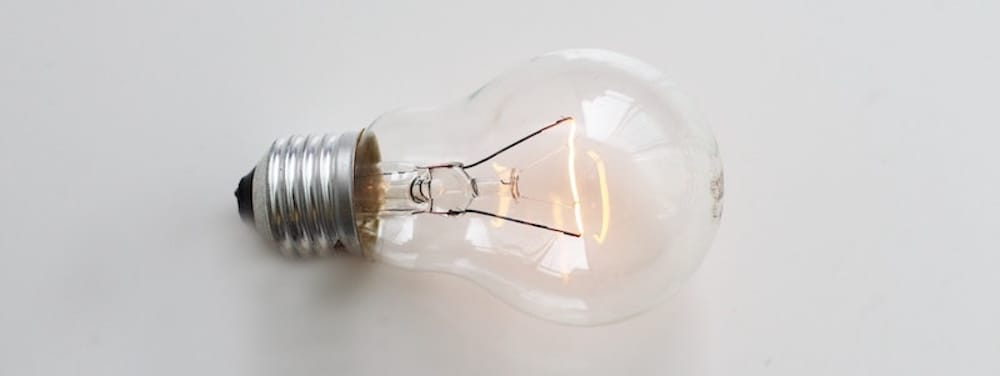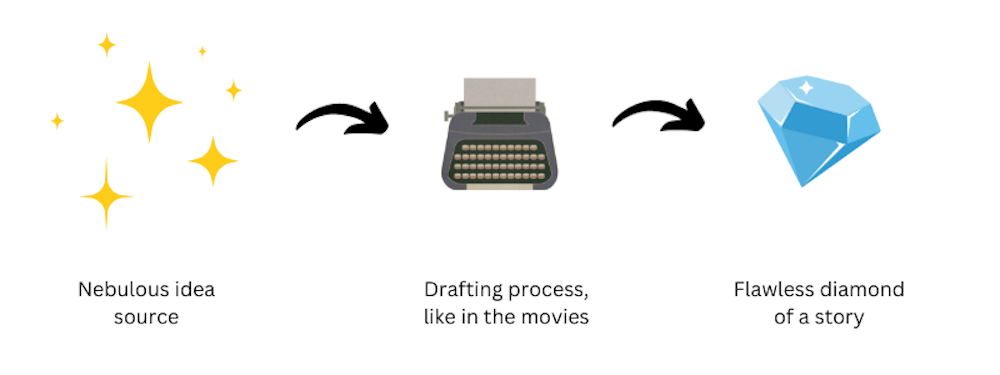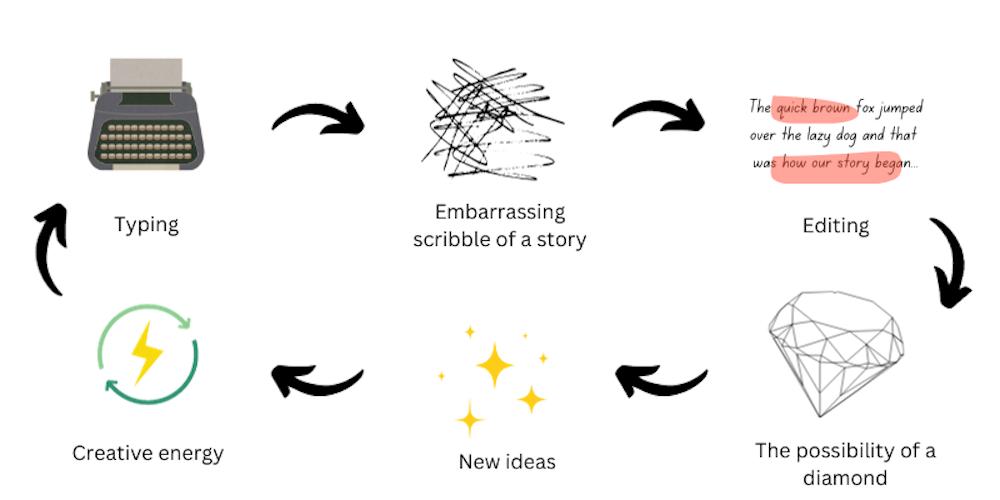The Draft to Idea Cycle
Where do ideas actually come from? I have both good news and bad news.

I've been writing since my early teens, but only consistently for about the past five years. Prior to 2019, I had seasons of productivity - months of angsting and not writing much at all, followed by brief floods of words. When I was in the midst of one of these floods, I felt incredible - driven, productive, like my fingers had a life of their own on the keyboard.
But it never lasted. Within a few days, I would falter, procrastinate, have a ‘bad day' where I only managed a couple of hundred words. I’d take a short break, worry about whether my ideas were drying up, re-read and re-work what I’d done, then gradually fall back into another fallow period of weeks or months.
This wasn’t exactly ineffective. Between 2005 and 2019, I wrote something like six novels. It worked out to roughly a novel every 18 months or so. But while this... anti-method sort of got novels written, it was immensely psychologically painful. Because those brief bursts of focus were preceded and followed by very, very deep plunges in my mood, energy and faith in my own creativity.
You see, I spent a lot of time (more time than I care to admit or even think about) worrying about my ideas.
If ideas are cheap, why are they so hard to find?
Ideas are cheap! It's all about the execution!
I heard that a lot when I was first looking around for writing advice and guidance. After I'd sat at my computer, stared at the screen, looked for exercises to get the creative juices flowing, typed and deleted a few beginnings, I decided there had to be some kind of reproducible Big Secret, some critical key to coming up with good ideas, that I was somehow missing. But when I looked around, over and over and over again I'd see the same thing, expressed in different ways. What it boiled down to was this.
Don't worry about ideas. Worry about improving your writing craft.
Oh, and how could we forget, my absolute favourite helpful/unhelpful advice, freely given in Reddit threads, newsletters, podcasts and Discord servers the world over:
Just Write!
To which, exasperated, I would throw up my hands and give up on writing for another few days or weeks. Because I felt like there was something missing for me. Whatever idea generation mechanism all these working writers had access to, I didn't. I had not been issued with a key to the idea safe. I had been left off the list for regular idea delivery. No envelopes came to my door with ideas folded neatly inside and no bolts from the blue arrived to illuminate the inside of my skull with bright flashes of purest inspiration. And how on earth could I work on my writing craft if I didn't have any ideas to write about?
I fretted. Why did all these people keep saying 'ideas are easy' when it felt like coming up with a good idea was the absolute hardest part of this whole writing malarkey? For a long time, I genuinely wondered if I was kidding myself. What kind of writer can't come up with ideas? That's Step 1, right?
Wrong.
The Idea to Draft Model
If you're like me back then, you think that ideas and writing work something like this:

As you can see, everything starts with a sort of... idea cloud. A well. A deep lake of inspiration. Sometimes inspiration strikes from outside, sometimes it comes from inside. But it always originates before the writing happens. The sequence is Idea > Draft > Edit > Finished Work.
This is the premise I operated on for years. It makes a lot of sense, right? It's reinforced by a million TV shows, films and books about writing, whether it's the inspired writer tearing new pages out of the typewriter as fast as they can finish them, or the frustrated writer repeatedly crumpling those same pages into balls and tossing them across the room. In all of those representations of the creative process, we see someone coming up with ideas, then executing them (or being dissatisfied with the execution). But it's always idea-to-draft.
There's a reason for this, of course. When you're an established writer, you do indeed draw from your idea pool and get to work. But when you're new to writing, that idea pool is shallow. It dries up easily. And because it's so shallow, when you gaze into it, everything looks tawdry and unoriginal and done to death. You end up in a demotivating and draining cycle - you feel like you have no ideas, or your ideas are terrible. So writing is really difficult, since you're struggling with the very idea of your own creativity. Which further convinces you that you have no ideas and well gee what if you're not actually a real writer at all?
Some writers linger in this strange, frustrating netherworld of creativity for years. I know I did. And some never escape it. They give up, or they tinker with the same piece of work for years, or just feel a desperate, bone-deep wish to write that turns them inside out for the rest of their lives, but which they never act on. It sucks.
I was lucky enough to have a little bit of inspiration occasionally, as well as a memory of the one time that I managed to write a lot of words in a short time - a successful NaNoWriMo completion back in 2005. Those two things were just enough to keep me going, but I never felt like I was improving my skills or developing a sustainable writing practice. It was just brief, glorious bursts of productivity followed by misery. So I listened to established writers, read blogs, watched panels, read craft books. Over and over again I heard 'ideas are cheap' and 'execution is everything' and the one that really burned, 'Just Write!'
I was clearly missing some fundamental element. I didn't know how to get there from here - how to bridge the gap between the impulse to write and the raw creative materials I felt like I needed to get started - ideas.
The missing piece
It turned out that there was something missing. I'm not sure if I was reading the wrong blog posts or watching the wrong panels or listening to the wrong podcasts, or if I was simply discounting or misunderstanding advice that was actually being offered to me. Now, this isn't a magic bullet. There is no magic bullet. Say it with me. There is no magic bullet.
What I have for you instead is a counterintuitive truth - writing doesn't come from ideas. It's the other way around. Ideas come from writing.
That's right. Writing creates ideas. Drafts produce inspiration.
The Draft to Idea Cycle
You see, when you're starting out as a writer, you don't have an idea pool. There's no reservoir to draw on apart from what you've read and seen in the world around you. That can be a deep well, but you don't yet have the skills or experience to draw on it properly. Your creative instinct is there, but the muscle memory of using your brain to bash stuff together to spark ideas isn't trained.
This seems like a Catch-22. How can you write without a worthy idea to practice on? You wouldn't want to waste your time would you?
You know what else wastes a lot of time? Wanting to write but not actually doing it.
So here's the missing step.
Move. your. fingers.
Work on things. Make a lot of very bad art. Doesn't matter, really, what it is. Fanfic. A movie script directly inspired by the last three things you saw. Extremely tropey space opera. A potboiler crime novel. A short story you've seen at least half a dozen writers do far better. This is what established writers actually mean when they cheerfully say 'Just Write!' - they don't mean 'try to write a great book, with all those great ideas you have'. They literally mean 'just move your fingers on a keyboard'.
Can't think of any ideas? Ideas are all terrible? Doesn't matter. Move your fingers. Type. Type some more. Make a LOT of words. Because, actually, early in your writing career, this is how the generation of ideas works:

Writers have to develop muscle memory too. Just like dancers, painters, ice skaters, archers, musicians. We tend to think, because any literate person has some ability to string sentences together, that we don't need to do the writing equivalent of scales, or practicing strumming patterns, or drilling your pirouettes, or experimenting with brush strokes. We can just jump to perfect execution. But it's not true. You have to do the scales. Sorry.
Let's be clear what I'm not necessarily suggesting here. I don't think you need to do a ton of writing exercises. These help some people (and in some cases can be utterly essential to breaking out of a particular mental or confidence deadlock). But I think for many writers, you don't need really need to practice specific skills. You need to just try and tell as many stories as possible. You are trying to develop skill at storytelling. And that has to be practiced.
So write terrible stories. Finish them. Write a LOT of terrible stories. Even if they're awful and make no sense. And you'll notice something very, very strange and wonderful will begin to happen.
Creating new pathways
When you begin to regularly use your brain to create stories, it does a very cool thing - it begins to store, retrieve, combine and synthesise. I call it a kind of 'magpie mode' - things that would have passed unnoticed a few weeks before suddenly get tucked away at the back of your brain, ready for use. And one day, when you're working away, probably on something terrible, I promise you an idea will drop out of the clear blue sky in a way which will shock you (and then excite you).
Thing is, this idea hasn't come out of the sky. It's come out of the synchrony of your brain, your hands, your consistent writing practice and the dopamine that ties those things together into a new pathway in your brain, a pathway with a little sign next to it that reads 'repeatable task that makes me feel good'. And let me tell you, once you've cracked that, you will have a completely new problem - figuring out which of your ideas are worth pursuing, because you will very quickly reach a point where you have more than you can possibly write.
And this is a self-perpetuating virtuous circle - the more you write, the more ideas you'll have. And the more you ideas you'll have, the stronger and more consistent your writing practice and motivation will become.
But it has to start with just. moving. your. hands.
In a few years time, when you're established and you're writing regularly and you're starting to have a little success in the field, you may well find a new writer coming to talk to you. And you may find that they are now where you were then, absolutely desperate to write but locked in a battle with their own idea of inspiration. Don't tell them 'ideas are cheap', even if it feels that way to you now, practiced as you are. Don't tell them 'execution is everything' because even though they're smiling, they're screaming internally that they have nothing to execute.
Try to remember what it felt like to be unsure if you were kidding yourself about being a writer, if you'd ever have a remotely creative idea in your entire life. Remember that hunger to make stories, coupled with an agonising uncertainty over where to even start.
Then remind them that making bad art, typing, getting words down, is how we make ideas.
Writing makes ideas and ideas make writing. But start by moving your hands.
